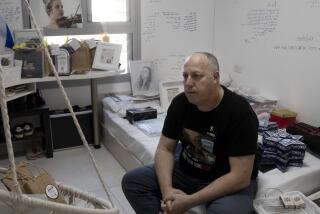To Soviet Jews, Passover This Year Is Special
- Share via
MOSCOW — While Soviet militiamen stood guard outside, thousands of worshipers gathered Thursday in Moscow’s century-old central synagogue to celebrate Passover, and the rabbi praised a revival in Jewish faith made possible by President Mikhail S. Gorbachev’s policies of reform.
“Some Jews are celebrating Passover for the first time here. The young have a growing interest in their religious faith because they are freer than before to express it,” said Rabbi Adolf S. Shiavich.
It has been a year of firsts for the Soviet Union’s Jews, with the opening of a yeshiva, or religious school, and a cultural center. The breath of fresh air that the new freedoms have brought to the Jewish community here was apparent Thursday during the special Passover service.
Shiavich said that about 11,000 people will have attended three services, held Wednesday night, Thursday morning and Thursday night--about 8,000 more than attended the Passover services here last year.
“Yes, we have more believers coming here now, which is a wonderful thing,” said one Moscow worshiper, Uri Hil, as he left Thursday’s morning service, a prayer shawl over his shoulders and a Torah, or Jewish religious book, wrapped in plain brown paper and held in his hands.
Hil said he has worshiped at the synagogue for the last 40 years and has never before witnessed such a rebirth in religious belief.
“There is even a public announcement about taking Hebrew classes, and teaching Hebrew used to be against the law,” he said.
During the rule of Josef Stalin, the synagogue remained open, but its rabbis were exiled to Siberia or sent to work camps, Shiavich said. A small core of Jews who gathered then to worship moved furtively in and out of the synagogue and prayed together without a rabbi, he said.
After Stalin’s death, rabbis again were permitted to lead synagogue services, but those Jews who attended the synagogue were monitored by the KGB security police, said Shiavich.
Shiavich, who has served as the synagogue’s rabbi for nine years, said he first noticed things were changing for the city’s Jews four years ago when Gorbachev became chief of the Communist Party.
“Today we are free to worship. The militiamen guard us, instead of writing down our names,” he said.
But he said that anti-Semitism could not be erased in four short years.
“My congregation complains to me often. They say they are harassed, shouted at, insulted. Poor upbringing cannot be so quickly erased,” he said.
Passover commemorates the Biblical Jewish flight from Egypt to Israel. It begins with a traditional meal, or seder, which includes bitter herbs to remind Jews of their enslavement in Egypt and unleavened bread called matzo, to remind Jews that their forefathers left Egypt so quickly they had no time to leaven their bread.
In previous years in Moscow, the central synagogue sought to provide enough matzos for the city’s observant Jewish community during the holiday.
Adequate Supply
But this Passover, for the first time, two city stores sold matzos, and one special bakery opened especially for Passover and baked and sold the unleavened bread.
Also, for the first time in more than 20 years, official delegates from Israel joined in Passover celebrations in Moscow.
An Israeli delegation arrived in Moscow in June to handle consular matters and inspect its embassy, which it was forced to abandon after Moscow broke ties with Jerusalem following the 1967 Middle East War.
“It was an interesting Passover,” said Hanon Achituv, one of the Israeli delegates in Moscow during the holiday. “We found that many Soviet Jews know about Passover but not about all its traditions.” Shiavich said what they need are books, written in Russian, about Jewish history and culture.
“Educating the young Jews, now that we can do so openly, is our greatest challenge,” he said.
The rabbi added that he thinks now, for the first time, it is possible for Jews to remain in the Soviet Union and live openly as Jews.
“There are a million and a half Jews left in this country,” he said. “We have remained here through the bad times, and now we will certainly stay--as long as God wishes.”
More to Read
Sign up for Essential California
The most important California stories and recommendations in your inbox every morning.
You may occasionally receive promotional content from the Los Angeles Times.













